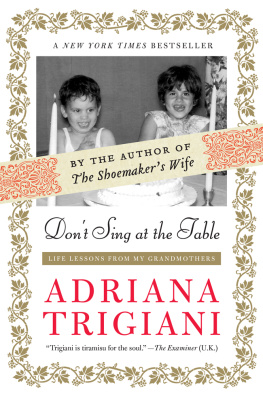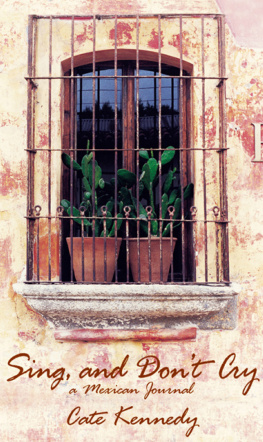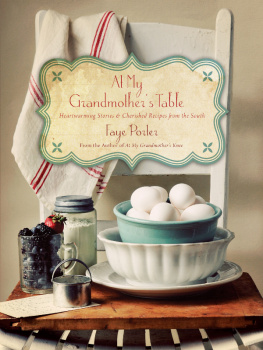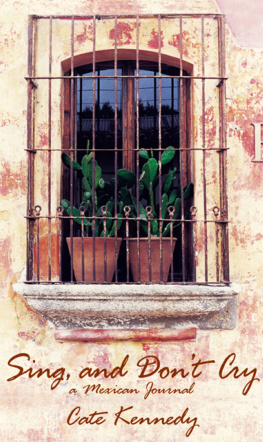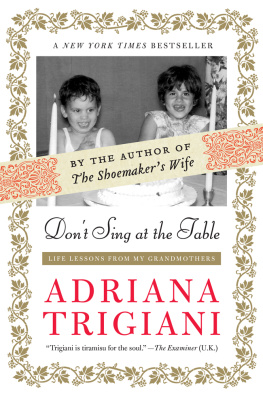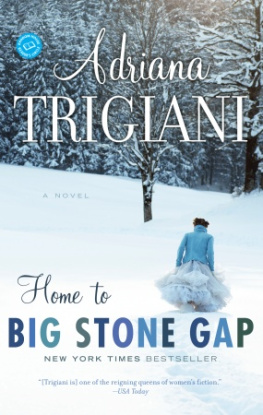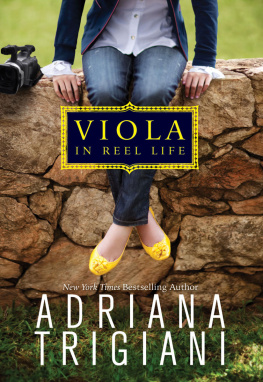For Lucia
This book is a work of nonfiction based upon my conversations with and observations of my grandmothers, Yolanda Perin Trigiani and Lucia Spada Bonicelli. This is a portrait of my life with them as I knew it. I have told these stories on these pages from my point of view, painted with a personal brush, in colors I chose, for the purpose of sharing my personal experience. Any resemblance to others, living or dead, is completely coincidental.
Adriana Trigiani
New York City
May 5, 2010
Contents

Lucia Spada, around age 22.

Yolanda Viola Perin, around age 20.
L uck is a wily thing. You can have a run of it, or get hit once and hard with the lucky stick, or luck may always seem like that handsome stranger across a crowded room, completely out of reach, even when youre wearing your best party dress and lipstick. You can see luck when others have it, but you know its not your turn. Sometimes it appears that luck is a birthright, making someone elses life seemed charmed from the outset. Luck is usually seen from a distance, from a place of want.
Not so for me.
I was truly lucky to have been given two stellar grandmothers, Lucia Spada Bonicelli (Lucy) and Yolanda Perin Trigiani (Viola). They showed me, in their own ways, how to get out of my own way and carve out a fulfilling life,
a peaceful life,
a gracious life,
and
a secure life.
My grandmothers bestowed on me, through their examples, the importance of developing character , rooted in kindness; and a spirit that might negotiate loss and rebound from grief to love more deeply. Their hope was that my spirit would serve to reinforce character when I fell short, made mistakes, or hurt someone I cared about through my own actions. For them, faith was the result of working through the spirit, and a tool, a means to go inward.
In dark moments when despair kicks joy to the curb, and I feel I dont have it in me to go one more step, I turn to my grandmothers for strength. In my memory are moments, glistening pop beads, the kind I played with as a girl. I string them together now in my minds eye and hold them close. They are not jewels to keep in a vault nor ones that would withstand any sort of appraisal. These are functional pearls, iridescent and simple in their beauty, yet indestructible. Unbreakable.
As I remember my grandmothers, I marvel at how they spent their time, and how they chose to fill up the years of their long lives. As women, our time is often ruled by the needs of those around us, but when I picture them, its never in a crowd, but alone in a window or a doorway. They survived loss and times of deep sorrow, but they would tell you that they were lucky too. They earned their luck by the labor of their own hands and their determination to see a goal through to completion.
Lucia and Viola poured themselves into the things they made, whether it was strands of fresh spaghetti or a wedding gown of duchess satin. They tended their gardens and their children. They built their companies and their relationships. They made time, they made things, they made a life.
The life lessons my grandmothers taught me help me stay the course, and here on these pages, I hope their wisdom might inspire you too. The past has a patina. Once the colors were bright and now they have faded. But looking closely now, from a distance, the details emerge richer in tone and texture, and ever more lovely in memory.
Adriana Trigiani
New York City
2010
Chapter One
Viola

Glamorous Viola at age 20.
Y olanda Perin Trigiani (Viola) stood at five feet five inches, but seemed much taller because she was short-waisted and had long legs. In her youth, she wore wide-brimmed hats, festooned with peacock plumes and adornments (silk flowers, bands of grosgrain, velvet berries), making her appear taller still. Even as a girl she had mature, striking looks and a serious countenance. Her ancestry was apparent in her strong profile, upright posture, and quick stride. Here comes the Venetian, theyd say when she walked down Garibaldi Avenue in Roseto, Pennsylvania.
Violas thick, jet-black hair fell in smooth waves. She had a square jaw, a prominent nose with a high bridge, dark brown eyes that were neither large nor limpid, but dark and intense, with a downcast lid (later in life, she contemplated an eye job when her lids became heavy, and it was difficult to read or to see stitch work up close, but decided against the surgery). She had beautiful lips, straight, strong white teeth, and a wide smile.
Think Joan Crawford.
My grandfather, Michael (nicknamed Dick), thought his Viola was an Italian version of the stunning star.
In fact, there was a bit of Hollywood stardust to their early courtshiptheir first date was to the movies to see Joan Crawford in Montana Moon . (By the way, Viola argued years later that they saw Carolina Moon . When I checked the chronology and told her that Joan Crawford made a movie in 1931 called Montana Moon , my grandmother replied, I was there. It was Carolina Moon . Oh, well.)
My grandparents met when they were in their early twenties (he was four years older than she) in a pants factory in Bangor, Pennsylvania. She was tagged as a leader early on. She excelled as a machine operator, then was promoted to forelady by the age of sixteen. By the time she met my grandfather, she was a pro, with a few years of management experience under her belt and fifty operators to oversee. She mastered every machine on the floor, knew how to get the best out of her operators, and managed them to exceed their numbers and output. Operators that worked under her remember her clear, distinctive voice, which could be heard over the loud buzz of machines in the factory.
Viola and Michaels love story was fraught with near misses. My grandfather left for a time and worked in mills as a machinist first in the Bronx and then in Connecticut. Viola thought shed lost him for good. But he eventually returned to his hometown, the factory, and to her, and, in 1932, they married.
Michael Anthony Trigiani had southern Italian (Bari) good looks, dark hair, full lips, and gray eyes. In pictures, he also seems matinee-idol handsome to me, but that may be Violas influence on the subject.
Back when she was wooing my grandfather, Viola would make him lunch every day and leave it for him in the pressing room. Those lunches became a theme with her. She made Italian delicacies, small, elegant sandwiches made with roasted peppers or thin-sliced capicola on the best bread, buttered lightly and wrapped in bleached, pressed cotton. There were ginger cookies, the size of a quarter, or slices of almond-scented pound cake, or oil pretzels, and always fresh fruit, figs, oranges, or a banana. There were thermoses of hot coffee, or bottles of cold soda. She thought of everythingutensils, napkins, portable ambience.
At the end of the workday, Viola would pick up the empty basket and take it home to repeat the process the next morning. I wondered what my grandfathers coworkers thought when their tough forelady extended this loving and gentle gesture to the man she loved each day.
Viola packed lunches throughout her life for all occasions: hampers loaded for long car trips, goody baskets left on doorsteps for someone in need, and later on, meals on-the-go for social excursions, including her gambling runs with her senior girlfriends to Atlantic City. Viola was not a warm, fuzzy character, but she showed her generosity and caring in those picnic hampers.

